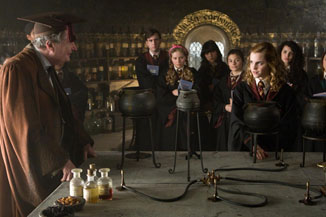Movie Review:
Harry Potter and the Half-Blood Prince
By Matthew Huntley
July 21, 2009
BoxOfficeProphets.com

With that said, Harry Potter and the Half-Blood Prince is a good film, but not a great film. The story and characters are stronger than ever, but the same can't be said of the storytelling. Director David Yates certainly knows how to show off all his resources, but he has to work at putting them together more fluidly. So much information is revealed in this installment that Yates seems to think the only way he can fit it all in is by telling the story through a series of distinct, isolated scenes, as if each event in the movie was also its own section of the book. Instead of feeling tightly bound by the same narrative, the scenes feel loose, as if they could take place anywhere within the saga. They don't seem exclusive to this particular story or bear much consequence.
For instance, there's a scene when Luna Lovegood (Evanna Lynch) fixes Harry's nose, and it's one of many when the movie sort of pauses, shows us an event that also occurred in the book (in the book, I learned it was actually Nymphadora Tonks who fixes Harry's nose), and moves on. It's almost like Yates and screenwriter Steve Kloves had a "novel to film" checklist in which they made sure everything was included on screen as a way to appease fans. Such an approach made the movie feel slow and labored, yet it was always watchable.
As Harry (Daniel Radcliffe) begins his sixth year at Hogwarts, he has spent the latter part of the summer traveling side by side with his master and mentor, Professor Dumbledore (Michael Gambon). After London is attacked by a team of Death Eaters, Dumbledore takes Harry along with him to Horace Slughorn (Jim Broadbent), a former professor whom Dumbledore asks to return and teach Potions. Dumbledore's request is part of a grander plan to gather crucial information from Slughorn, who has a key memory within him that reveals how their former student, Tom Riddle — a.k.a. the evil Lord Voldemort — came to be so powerful.
Harry is asked by Dumbledore to get to know Slughorn, as well as keep an eye on the scheming Draco Malfoy (Tom Felton) and the questionable Professor Snape (Alan Rickman). Both have teamed up with Voldemort's followers, Bellatrix Lestrange (Helen Bonham Carter) and Fenrir Greyback (Dave Legeno), although we're not quite sure if Malfoy and Snape's hearts are truly good or evil.
Once again, Harry must balance his mortal woes with his own personal struggles with love, friendship and adolescence. He's more in love than ever with Ginny Weasley (Bonnie Wright), sister of his best friend Ron (Rupert Grint), and finds himself comforting Hermione (Emma Watson), who's stricken with hurt and jealousy when Ron begins dating Lavender Brown (Jessie Cave).
Ever since The Goblet of Fire, the series has had a lot of fun with its teenage drama, but this aspect of the story is progressing rather sluggishly. I'm sure there will come a point when Ron and Hermione finally declare their love for each other, but jeez, when is it going to happen already? I feel like we experience the same adolescent love triangles over and over again in this series.
Like The Order of the Phoenix, there is also less action this time around, which deflates the energy a bit, but I'm glad the Quidditch scenes are limited. After six movies, we've grown beyond the Quidditch matches and are more interested in the characters' serious problems.
It's hard to write anything more about the plot without giving away too many details, but Harry Potter and the Half-Blood Prince excited me for The Deathly Hallows and encouraged me to read the books. I only wish the filmmakers had treated this part less as set up for "the big showdown" and more as its own story. It sort of projects an attitude that it's what happens later on that really matters, as if this is mostly filler material. Even the ending, which readers of the book no doubt already know, comes across as less shocking and significant than it's intended. Or maybe it was just the lackadaisical way it was filmed.
As usual, the film's technical achievements are thoroughly impressive. The sets, photography and special effects are striking and brilliant, generating a morbid and brooding atmosphere that was a wonder to behold. The studio and filmmakers have spared no expense to create an entirely different world, one that's darker and less cheerful than we're used to from the series. After so many years, it's amazing the franchise is still able to capture us with its visuals. It's also a wonder the filmmakers are able to manifest Rowling's imaginative words so seamlessly with such awesome imagery.
Between now and The Deathly Hallows: Part I, perhaps I'll read the books and come to appreciate the slower pace at which the series is moving. I've criticized the filmed adaptations long enough from the point of view of a non-reader, but I think it's time to see if the books really do make a difference. The last two Harry Potter films have suggested something big is about to go down at Hogwarts, and I'm sure there's plenty of story left to tell. I just hope the cinematic storytelling lives up to it, and hopefully without the influence of the literature.